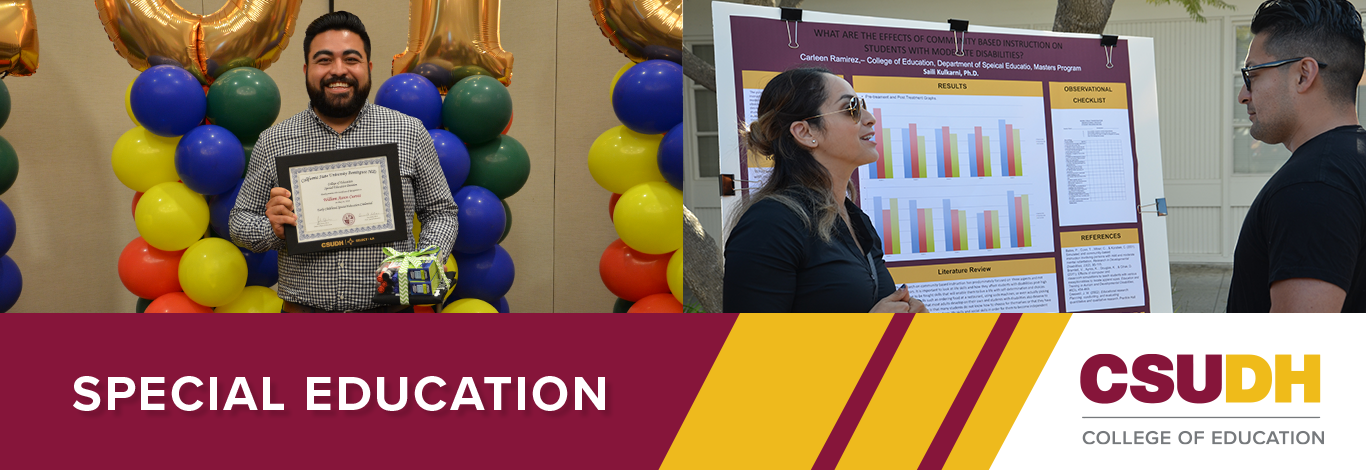Special Education
Latest News

The Special Education Program is designed to meet the needs of college graduates who wish to pursue careers in Special Education by earning a preliminary credential, clear credential or an MA in Special Education. Credential and master's level course work combine theory, methods, and field experiences to enrich candidates teaching practices and enhance professional expertise. Additional information appears in the Special Education Handbook.
Preliminary Education Specialist Credential Programs/Pathways
Preliminary Credential Programs
Mild Moderate Support Needs (MMSN) includes assessments specific to student progress in the core academic areas and to provide services to students who have Autism (Autism), Emotional Disturbance (ED), Intellectual Disability (ID), Multiple Disabilities (MD), Other Health Impairment (OHI), Orthopedic Impairment (OI), Specific Learning Disability (SLD) and Traumatic Brain Injury (TBI) and authorizes service in grades K-12 and classes organized primarily for adults through age 22.
Extensive Support Needs (ESN) includes Autism (Autism), Deaf-Blindness (DB), Emotional Disturbance (ED), Intellectual Disability (ID), Multiple Disabilities (MD), Other Health Impairment (OHI), Orthopedic Impairment (OI), Specific Learning Disability (SLD) and Traumatic Brain Injury (TBI) and authorizes service in grades K-12 and classes organized primarily for adults through age 22.
Early Childhood Special Education (ECSE) includes mild/moderate support needs and extensive support needs listed above and traumatic brain injury; and authorizes the provision of services to infants, toddlers, and young children from birth to age 5 with stated disabilities and their families.
Early Childhood Special Education Bridge Certificate authorizes CSUDH ECSE credential holders who entered the program prior to June 1, 2022 seeking to add an authorization to teach Transition Kindergarten (TK) and Kindergarten. The CCTC has provided a "bridge pathway" to expand authorization to TK and K. Existing ECSE Preliminary and Clear holders will need to demonstrate they have met certain Teacher Performance Expectations. Alumni of CSUDH ECSE Credential program are eligible to "upgrade to this new ECSE authorization" if you meet these standards. To apply for the new ECSE authorization, please complete the ECSE Bridge Requirement Form. You will send the completed form to SPE Administrative Coordinator, Jasmine Combs for processing.
Preliminary Credential Pathways
Intern Option: The Special Education Intern Program (SEIP) is an alternative credential pathway that allows candidates to work in P-12 schools as teachers-of-record while they complete university coursework necessary to obtain their credential. The SEIP is a collaborative effort with school districts, Non-Public School (NPS), or Charter Schools. Interns receive assistance from school site support providers and university supervisors.
Student Teaching Option: The Student Teaching Program is a traditional credential pathway that allows student teachers to be placed in public school P-12 classrooms under the guidance of a Master Teacher for fieldwork experiences while completing university coursework necessary to obtain their credential.
Integrated Teacher Education Program (ITEP) Mild/Moderate Educational Specialists: The ITEP Program for the Education Specialist Mild Moderate Support Needs Credential is an option within the undergraduate Liberal Studies major wherein students earn a BA degree in Liberal Studies while also earning an Education Specialist Credential-Mild Moderate Support Needs (Student Teaching Option only). To meet all requirements for the ITEP program, students must also complete a depth of study in Educating Children with Disabilities and be accepted into the Special Education Credential Program. The total number of units for the BA and Credential is 135 units. Please see the Liberal Studies section of the catalog, as well as an advisor in the Liberal Studies Office for more information about the ITEP Option.
Advanced Programs
Teacher Induction Program leading to a Clear Education Specialist Credential Program: This program is designed for holders of a Preliminary Credential (MMSN; EXSN; ECSE) and includes advanced coursework and Individual Induction Plans. Click here for program requirements. For more information regarding the program, please contact the SPE Chair or SPE Advisor at 310-243-2779.
Master's Degree: The master's degree program is based on curriculum that prepares candidates to assume advanced roles in the field of Special Education. The capstone experience for this degree includes a thesis or a comprehensive essay exam.
Undocumented students are able to apply for and receive professional education credentials. There is no citizenship or immigration status requirement for credentials in CA. However, in order to complete the livescan process and CTC application for a certificate of clearance or a credential, students would need to have an Individual Tax Identification Number (ITIN). Finally, this policy applies specifically to credential programs and does not account for employment after being credentialed. Please feel welcome to contact our Education Pathways Specialist, Karla Chacon if you have questions: kchacon10@csudh.edu